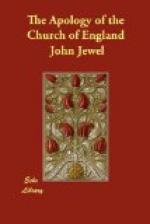Truly there had been no need to handle so plain a matter as this is with so many words, and so at length, if we had not to do with those men who, for a desire they have to strive and to win the mastery, use of course to deny all things, be they never so clear—yea, the very same which they presently see and behold with their own eyes. The Emperor Justinian made a law to correct the behaviour of the clergy, and to cut short the insolency of the priests. And albeit he were a Christian and a Catholic prince, yet put he down from their papal throne two Popes, Sylverius and Vigilius, notwithstanding they were Peter’s successors and Christ’s vicars.
Let us see, then, such men as have authority over the bishops, such men as receive from God commandments concerning religion, such as bring home again the Ark of God, make holy hymns, oversee the priests, build the Temple, make orations touching Divine service, cleanse the temples, destroy the hill altars, burn the idols’ groves, teach the priests their duties, write them out precepts how they should live, kill the wicked prophets, displace the high priests, call together the councils of bishops, sit together with the bishops, instructing them what they ought to do, condemn and punish an heretical bishop, be made acquainted with matters of religion, which subscribe and give sentence; and do all these things, not by any other man’s commission, but in their own name, and that both uprightly and godly: shall we say it pertaineth not to such men to have to do with religion? or shall we say a Christian magistrate, which dealeth amongst others in these matters, doth either naughtily, or presumptuously, or wickedly? The most ancient and Christian emperors and kings that ever were, did busy themselves with these matters, and yet were they never for this cause noted either of wickedness or of presumption. And what is he that can find out either more Catholic princes or more notable examples?
Wherefore, if it were lawful for them to do thus, being but civil magistrates, and having the chief rule of commonweals, what offence have our princes at this day made, which may not have leave to do the like, being in the like degree? or what especial gift of learning, or of judgment, or of holiness have these men now, that, contrary to the custom of all the ancient and Catholic bishops, who used to confer with princes and peers concerning religion, they do now thus reject and cast off Christian princes from knowing of the cause, and from their meetings? Well, thus doing, they wisely and warily provide for themselves and for their kingdom, which otherwise they see is like shortly to come to nought. For if so be they whom God hath placed in greatest dignity did see and perceive these men’s practices, how Christ’s commandments be despised by them, how the light of the Gospel is darkened and quenched out by them, and how themselves also be subtly beguiled and mocked, and unawares be deluded by them, and the way to the kingdom of heaven stopped up before them: no doubt they would never so quietly suffer themselves neither to be disdained after such a proud sort, nor so despitefully to be scorned and abused by them. But now, through their own lack of understanding, and through their own blindness, these men have them fast yoked, and in their danger.




